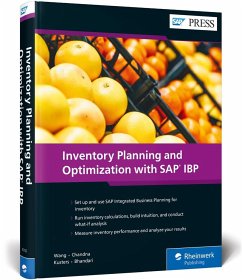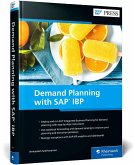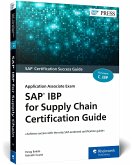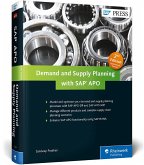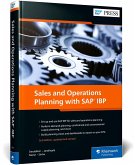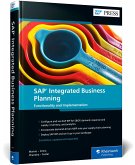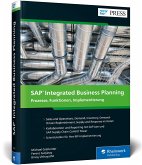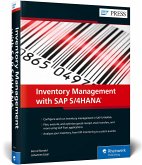Lei Wang, Sanchit Chandna, Jeroen Kusters, Atul Bhandari
Inventory Planning and Optimization with SAP IBP
Mitarbeit:Bhandari, Atul; Kusters, Jeroen; Wang, Lei; Chandna, Sanchit
Lei Wang, Sanchit Chandna, Jeroen Kusters, Atul Bhandari
Inventory Planning and Optimization with SAP IBP
Mitarbeit:Bhandari, Atul; Kusters, Jeroen; Wang, Lei; Chandna, Sanchit
- Gebundenes Buch
- Merkliste
- Auf die Merkliste
- Bewerten Bewerten
- Teilen
- Produkt teilen
- Produkterinnerung
- Produkterinnerung
How much inventory is ideal? From setting service target levels and lead times to managing demand variability, learn to calculate and plan the best way to handle your inventory. Configure SAP Integrated Business Planning for inventory and model your supply network. Then optimize your inventory practices and measure your performance through KPIs, reports, and dashboards. Plan and control your stock levels with this all-in-one guide!
Highlights:
1) Master data 2) Planning areas 3) Supply network models 4) Replenishment 5) Lead times 6) Safety stock 7) Inventory types 8) What-if analysis 9) Integration 10) Implementation planning 11) Case studies…mehr
Andere Kunden interessierten sich auch für
![Demand Planning with SAP IBP Demand Planning with SAP IBP]() Venkadesh SeetharamanDemand Planning with SAP IBP71,99 €
Venkadesh SeetharamanDemand Planning with SAP IBP71,99 €![SAP IBP for Supply Chain Certification Guide SAP IBP for Supply Chain Certification Guide]() Parag BakdeSAP IBP for Supply Chain Certification Guide63,99 €
Parag BakdeSAP IBP for Supply Chain Certification Guide63,99 €![Demand and Supply Planning with SAP Apo Demand and Supply Planning with SAP Apo]() Sandeep PradhanDemand and Supply Planning with SAP Apo68,99 €
Sandeep PradhanDemand and Supply Planning with SAP Apo68,99 €![Sales and Operations Planning with SAP IBP Sales and Operations Planning with SAP IBP]() Sagar DeolalikarSales and Operations Planning with SAP IBP72,99 €
Sagar DeolalikarSales and Operations Planning with SAP IBP72,99 €![SAP Integrated Business Planning SAP Integrated Business Planning]() Sandy MarkinSAP Integrated Business Planning64,99 €
Sandy MarkinSAP Integrated Business Planning64,99 €![SAP Integrated Business Planning SAP Integrated Business Planning]() Michael GrafunderSAP Integrated Business Planning79,90 €
Michael GrafunderSAP Integrated Business Planning79,90 €![Inventory Management with SAP S/4HANA Inventory Management with SAP S/4HANA]() Bernd RoedelInventory Management with SAP S/4HANA91,99 €
Bernd RoedelInventory Management with SAP S/4HANA91,99 €-
-
-
How much inventory is ideal? From setting service target levels and lead times to managing demand variability, learn to calculate and plan the best way to handle your inventory. Configure SAP Integrated Business Planning for inventory and model your supply network. Then optimize your inventory practices and measure your performance through KPIs, reports, and dashboards. Plan and control your stock levels with this all-in-one guide!
Highlights:
1) Master data
2) Planning areas
3) Supply network models
4) Replenishment
5) Lead times
6) Safety stock
7) Inventory types
8) What-if analysis
9) Integration
10) Implementation planning
11) Case studies
Hinweis: Dieser Artikel kann nur an eine deutsche Lieferadresse ausgeliefert werden.
Highlights:
1) Master data
2) Planning areas
3) Supply network models
4) Replenishment
5) Lead times
6) Safety stock
7) Inventory types
8) What-if analysis
9) Integration
10) Implementation planning
11) Case studies
Hinweis: Dieser Artikel kann nur an eine deutsche Lieferadresse ausgeliefert werden.
Produktdetails
- Produktdetails
- SAP PRESS Englisch
- Verlag: Rheinwerk Verlag / SAP PRESS
- Artikelnr. des Verlages: 459/21792
- Seitenzahl: 419
- Erscheinungstermin: 23. Mai 2019
- Englisch
- Abmessung: 236mm x 184mm x 33mm
- Gewicht: 914g
- ISBN-13: 9781493217922
- ISBN-10: 1493217925
- Artikelnr.: 54692400
- Herstellerkennzeichnung
- Libri GmbH
- Europaallee 1
- 36244 Bad Hersfeld
- gpsr@libri.de
- SAP PRESS Englisch
- Verlag: Rheinwerk Verlag / SAP PRESS
- Artikelnr. des Verlages: 459/21792
- Seitenzahl: 419
- Erscheinungstermin: 23. Mai 2019
- Englisch
- Abmessung: 236mm x 184mm x 33mm
- Gewicht: 914g
- ISBN-13: 9781493217922
- ISBN-10: 1493217925
- Artikelnr.: 54692400
- Herstellerkennzeichnung
- Libri GmbH
- Europaallee 1
- 36244 Bad Hersfeld
- gpsr@libri.de
Lei Wang is the director of product management, supply chain, at SAP and the product owner for the underlying supply chain algorithm library beneath SAP Integrated Business Planning for inventory and demand. He has more than a decade of experience in the research and development of enterprise inventory and service optimization solutions. He has also worked with expert users, planners, supply chain analysts, and consultants on various SAP Integrated Business Planning for inventory implementations. Lei Wang has a Ph.D. in industrial and systems engineering from the University of Minnesota.
... Preface ... 15
... Who This Book Is For ... 15
... How This Book Is Organized ... 15
... Acknowledgements ... 18
... Conclusion ... 19
1 ... Introduction to Inventory Planning and Optimization ... 21
1.1 ... What Is Inventory? ... 22
1.2 ... Where Is Inventory Held? ... 28
1.3 ... Building an Inventory Management Approach ... 29
1.4 ... Objectives of Inventory Planning and Optimization ... 34
1.5 ... Role of Technology in Inventory Planning and Optimization ... 36
1.6 ... Introducing SAP Integrated Business Planning ... 40
1.7 ... Summary ... 56
2 ... Understanding Inventory Variables ... 57
2.1 ... Primary Factors that Drive Inventory ... 57
2.2 ... Breakdown of Variability Drivers ... 75
2.3 ... Additional Factors that Influence Inventory ... 92
2.4 ... Summary ... 104
3 ... Configuring SAP IBP for Inventory ... 105
3.1 ... Architecture ... 105
3.2 ... Building Blocks ... 106
3.3 ... Planning Area Setup Using Predelivered Content ... 134
3.4 ... Versions ... 139
3.5 ... Scenarios ... 142
3.6 ... Planning Operators ... 143
3.7 ... Reason Codes ... 146
3.8 ... Data Integration ... 148
3.9 ... Planning Views ... 148
3.10 ... Dashboard and Analytics ... 153
3.11 ... Summary ... 156
4 ... Modeling a Supply Network ... 157
4.1 ... Introduction to Supply Networks ... 157
4.2 ... Supply Network Complexity ... 159
4.3 ... Elements of a Supply Network ... 164
4.4 ... Visualizing Supply Networks in SAP IBP ... 181
4.5 ... Summary ... 184
5 ... Optimizing Inventory in SAP IBP ... 185
5.1 ... What Is Network Inventory Optimization in SAP IBP? ... 185
5.2 ... Building Blocks for Inventory Calculation ... 187
5.3 ... Network Multiechelon Inventory Calculation ... 201
5.4 ... Summary ... 230
6 ... Structuring Inventory ... 231
6.1 ... Types of Inventory ... 231
6.2 ... Further Decomposition of Safety Stock ... 237
6.3 ... Calculating Inventory Components ... 241
6.4 ... Summary ... 251
7 ... Designing Your Inventory Planning Process ... 253
7.1 ... Centralized and Decentralized Inventory Planning Teams ... 253
7.2 ... Frequency of the Inventory Planning Cycle ... 255
7.3 ... From Reactive to Proactive Planner Tasks ... 257
7.4 ... Inventory Planning in Sales and Operations Planning ... 258
7.5 ... Sequence of Planning Tasks ... 260
7.6 ... Segmentation ... 270
7.7 ... Role of the Inventory Planner ... 272
7.8 ... Summary ... 273
8 ... Measuring Inventory Performance ... 275
8.1 ... Example Supply Chain for Inventory Planning ... 275
8.2 ... Key Performance Indicators for Inventory Optimization ... 279
8.3 ... Validate Input Quality ... 281
8.4 ... Review Inventory Plan ... 287
8.5 ... Assess Inventory Drivers ... 289
8.6 ... Finalize Inventory Plan ... 294
8.7 ... Create Custom Inventory Alerts ... 299
8.8 ... Summary ... 310
9 ... Building Intuition and Conducting What-If Analysis ... 311
9.1 ... What-If Analysis with Versions and Scenarios ... 312
9.2 ... Perform What-If Analysis ... 313
9.3 ... Simulating Situations ... 319
9.4 ... Intuition Building ... 332
9.5 ... Strategic What-If Analysis ... 334
9.6 ... Tactical What-If Analysis ... 337
9.7 ... Summary ... 338
10 ... Integrating SAP IBP for Inventory ... 339
10.1 ... Data Integration Technologies ... 339
10.2 ... Manual Data Integration Using the Web UI ... 342
10.3 ... Integration using SAP Cloud Platform Integration for Data Services ... 350
10.4 ... With SAP IBP Applications in the Unified Planning Area ... 361
10.5 ... With SAP ERP and SAP S/4HANA ... 362
10.6 ... With SAP APO ... 365
10.7 ... With Non-SAP Systems ... 366
10.8 ... Exporting Data Using OData Services ... 367
10.9 ... Summary ... 367
11 ... Planning Your Implementation ... 369
11.1 ... Cloud Software Considerations ... 369
11.2 ... Manual versus Automated Workflow ... 374
11.3 ... Agile versus Waterfall Implementation Methodology ... 382
11.4 ... Roles and Responsibilities ... 389
11.5 ... Summary ... 391
12 ... Case Studies ... 393
12.1 ... Case Study 1: Manufacturing Industry ... 393
12.2 ... Case Study 2: Consumer Goods ... 396
12.3 ... Case Study 3: High-Tech Company ... 399
12.4 ... Case Study 4: Consumer Products ... 402
12.5 ... Summary ... 406
A ... The Authors ... 407
... Index ... 409
... Who This Book Is For ... 15
... How This Book Is Organized ... 15
... Acknowledgements ... 18
... Conclusion ... 19
1 ... Introduction to Inventory Planning and Optimization ... 21
1.1 ... What Is Inventory? ... 22
1.2 ... Where Is Inventory Held? ... 28
1.3 ... Building an Inventory Management Approach ... 29
1.4 ... Objectives of Inventory Planning and Optimization ... 34
1.5 ... Role of Technology in Inventory Planning and Optimization ... 36
1.6 ... Introducing SAP Integrated Business Planning ... 40
1.7 ... Summary ... 56
2 ... Understanding Inventory Variables ... 57
2.1 ... Primary Factors that Drive Inventory ... 57
2.2 ... Breakdown of Variability Drivers ... 75
2.3 ... Additional Factors that Influence Inventory ... 92
2.4 ... Summary ... 104
3 ... Configuring SAP IBP for Inventory ... 105
3.1 ... Architecture ... 105
3.2 ... Building Blocks ... 106
3.3 ... Planning Area Setup Using Predelivered Content ... 134
3.4 ... Versions ... 139
3.5 ... Scenarios ... 142
3.6 ... Planning Operators ... 143
3.7 ... Reason Codes ... 146
3.8 ... Data Integration ... 148
3.9 ... Planning Views ... 148
3.10 ... Dashboard and Analytics ... 153
3.11 ... Summary ... 156
4 ... Modeling a Supply Network ... 157
4.1 ... Introduction to Supply Networks ... 157
4.2 ... Supply Network Complexity ... 159
4.3 ... Elements of a Supply Network ... 164
4.4 ... Visualizing Supply Networks in SAP IBP ... 181
4.5 ... Summary ... 184
5 ... Optimizing Inventory in SAP IBP ... 185
5.1 ... What Is Network Inventory Optimization in SAP IBP? ... 185
5.2 ... Building Blocks for Inventory Calculation ... 187
5.3 ... Network Multiechelon Inventory Calculation ... 201
5.4 ... Summary ... 230
6 ... Structuring Inventory ... 231
6.1 ... Types of Inventory ... 231
6.2 ... Further Decomposition of Safety Stock ... 237
6.3 ... Calculating Inventory Components ... 241
6.4 ... Summary ... 251
7 ... Designing Your Inventory Planning Process ... 253
7.1 ... Centralized and Decentralized Inventory Planning Teams ... 253
7.2 ... Frequency of the Inventory Planning Cycle ... 255
7.3 ... From Reactive to Proactive Planner Tasks ... 257
7.4 ... Inventory Planning in Sales and Operations Planning ... 258
7.5 ... Sequence of Planning Tasks ... 260
7.6 ... Segmentation ... 270
7.7 ... Role of the Inventory Planner ... 272
7.8 ... Summary ... 273
8 ... Measuring Inventory Performance ... 275
8.1 ... Example Supply Chain for Inventory Planning ... 275
8.2 ... Key Performance Indicators for Inventory Optimization ... 279
8.3 ... Validate Input Quality ... 281
8.4 ... Review Inventory Plan ... 287
8.5 ... Assess Inventory Drivers ... 289
8.6 ... Finalize Inventory Plan ... 294
8.7 ... Create Custom Inventory Alerts ... 299
8.8 ... Summary ... 310
9 ... Building Intuition and Conducting What-If Analysis ... 311
9.1 ... What-If Analysis with Versions and Scenarios ... 312
9.2 ... Perform What-If Analysis ... 313
9.3 ... Simulating Situations ... 319
9.4 ... Intuition Building ... 332
9.5 ... Strategic What-If Analysis ... 334
9.6 ... Tactical What-If Analysis ... 337
9.7 ... Summary ... 338
10 ... Integrating SAP IBP for Inventory ... 339
10.1 ... Data Integration Technologies ... 339
10.2 ... Manual Data Integration Using the Web UI ... 342
10.3 ... Integration using SAP Cloud Platform Integration for Data Services ... 350
10.4 ... With SAP IBP Applications in the Unified Planning Area ... 361
10.5 ... With SAP ERP and SAP S/4HANA ... 362
10.6 ... With SAP APO ... 365
10.7 ... With Non-SAP Systems ... 366
10.8 ... Exporting Data Using OData Services ... 367
10.9 ... Summary ... 367
11 ... Planning Your Implementation ... 369
11.1 ... Cloud Software Considerations ... 369
11.2 ... Manual versus Automated Workflow ... 374
11.3 ... Agile versus Waterfall Implementation Methodology ... 382
11.4 ... Roles and Responsibilities ... 389
11.5 ... Summary ... 391
12 ... Case Studies ... 393
12.1 ... Case Study 1: Manufacturing Industry ... 393
12.2 ... Case Study 2: Consumer Goods ... 396
12.3 ... Case Study 3: High-Tech Company ... 399
12.4 ... Case Study 4: Consumer Products ... 402
12.5 ... Summary ... 406
A ... The Authors ... 407
... Index ... 409
... Preface ... 15
... Who This Book Is For ... 15
... How This Book Is Organized ... 15
... Acknowledgements ... 18
... Conclusion ... 19
1 ... Introduction to Inventory Planning and Optimization ... 21
1.1 ... What Is Inventory? ... 22
1.2 ... Where Is Inventory Held? ... 28
1.3 ... Building an Inventory Management Approach ... 29
1.4 ... Objectives of Inventory Planning and Optimization ... 34
1.5 ... Role of Technology in Inventory Planning and Optimization ... 36
1.6 ... Introducing SAP Integrated Business Planning ... 40
1.7 ... Summary ... 56
2 ... Understanding Inventory Variables ... 57
2.1 ... Primary Factors that Drive Inventory ... 57
2.2 ... Breakdown of Variability Drivers ... 75
2.3 ... Additional Factors that Influence Inventory ... 92
2.4 ... Summary ... 104
3 ... Configuring SAP IBP for Inventory ... 105
3.1 ... Architecture ... 105
3.2 ... Building Blocks ... 106
3.3 ... Planning Area Setup Using Predelivered Content ... 134
3.4 ... Versions ... 139
3.5 ... Scenarios ... 142
3.6 ... Planning Operators ... 143
3.7 ... Reason Codes ... 146
3.8 ... Data Integration ... 148
3.9 ... Planning Views ... 148
3.10 ... Dashboard and Analytics ... 153
3.11 ... Summary ... 156
4 ... Modeling a Supply Network ... 157
4.1 ... Introduction to Supply Networks ... 157
4.2 ... Supply Network Complexity ... 159
4.3 ... Elements of a Supply Network ... 164
4.4 ... Visualizing Supply Networks in SAP IBP ... 181
4.5 ... Summary ... 184
5 ... Optimizing Inventory in SAP IBP ... 185
5.1 ... What Is Network Inventory Optimization in SAP IBP? ... 185
5.2 ... Building Blocks for Inventory Calculation ... 187
5.3 ... Network Multiechelon Inventory Calculation ... 201
5.4 ... Summary ... 230
6 ... Structuring Inventory ... 231
6.1 ... Types of Inventory ... 231
6.2 ... Further Decomposition of Safety Stock ... 237
6.3 ... Calculating Inventory Components ... 241
6.4 ... Summary ... 251
7 ... Designing Your Inventory Planning Process ... 253
7.1 ... Centralized and Decentralized Inventory Planning Teams ... 253
7.2 ... Frequency of the Inventory Planning Cycle ... 255
7.3 ... From Reactive to Proactive Planner Tasks ... 257
7.4 ... Inventory Planning in Sales and Operations Planning ... 258
7.5 ... Sequence of Planning Tasks ... 260
7.6 ... Segmentation ... 270
7.7 ... Role of the Inventory Planner ... 272
7.8 ... Summary ... 273
8 ... Measuring Inventory Performance ... 275
8.1 ... Example Supply Chain for Inventory Planning ... 275
8.2 ... Key Performance Indicators for Inventory Optimization ... 279
8.3 ... Validate Input Quality ... 281
8.4 ... Review Inventory Plan ... 287
8.5 ... Assess Inventory Drivers ... 289
8.6 ... Finalize Inventory Plan ... 294
8.7 ... Create Custom Inventory Alerts ... 299
8.8 ... Summary ... 310
9 ... Building Intuition and Conducting What-If Analysis ... 311
9.1 ... What-If Analysis with Versions and Scenarios ... 312
9.2 ... Perform What-If Analysis ... 313
9.3 ... Simulating Situations ... 319
9.4 ... Intuition Building ... 332
9.5 ... Strategic What-If Analysis ... 334
9.6 ... Tactical What-If Analysis ... 337
9.7 ... Summary ... 338
10 ... Integrating SAP IBP for Inventory ... 339
10.1 ... Data Integration Technologies ... 339
10.2 ... Manual Data Integration Using the Web UI ... 342
10.3 ... Integration using SAP Cloud Platform Integration for Data Services ... 350
10.4 ... With SAP IBP Applications in the Unified Planning Area ... 361
10.5 ... With SAP ERP and SAP S/4HANA ... 362
10.6 ... With SAP APO ... 365
10.7 ... With Non-SAP Systems ... 366
10.8 ... Exporting Data Using OData Services ... 367
10.9 ... Summary ... 367
11 ... Planning Your Implementation ... 369
11.1 ... Cloud Software Considerations ... 369
11.2 ... Manual versus Automated Workflow ... 374
11.3 ... Agile versus Waterfall Implementation Methodology ... 382
11.4 ... Roles and Responsibilities ... 389
11.5 ... Summary ... 391
12 ... Case Studies ... 393
12.1 ... Case Study 1: Manufacturing Industry ... 393
12.2 ... Case Study 2: Consumer Goods ... 396
12.3 ... Case Study 3: High-Tech Company ... 399
12.4 ... Case Study 4: Consumer Products ... 402
12.5 ... Summary ... 406
A ... The Authors ... 407
... Index ... 409
... Who This Book Is For ... 15
... How This Book Is Organized ... 15
... Acknowledgements ... 18
... Conclusion ... 19
1 ... Introduction to Inventory Planning and Optimization ... 21
1.1 ... What Is Inventory? ... 22
1.2 ... Where Is Inventory Held? ... 28
1.3 ... Building an Inventory Management Approach ... 29
1.4 ... Objectives of Inventory Planning and Optimization ... 34
1.5 ... Role of Technology in Inventory Planning and Optimization ... 36
1.6 ... Introducing SAP Integrated Business Planning ... 40
1.7 ... Summary ... 56
2 ... Understanding Inventory Variables ... 57
2.1 ... Primary Factors that Drive Inventory ... 57
2.2 ... Breakdown of Variability Drivers ... 75
2.3 ... Additional Factors that Influence Inventory ... 92
2.4 ... Summary ... 104
3 ... Configuring SAP IBP for Inventory ... 105
3.1 ... Architecture ... 105
3.2 ... Building Blocks ... 106
3.3 ... Planning Area Setup Using Predelivered Content ... 134
3.4 ... Versions ... 139
3.5 ... Scenarios ... 142
3.6 ... Planning Operators ... 143
3.7 ... Reason Codes ... 146
3.8 ... Data Integration ... 148
3.9 ... Planning Views ... 148
3.10 ... Dashboard and Analytics ... 153
3.11 ... Summary ... 156
4 ... Modeling a Supply Network ... 157
4.1 ... Introduction to Supply Networks ... 157
4.2 ... Supply Network Complexity ... 159
4.3 ... Elements of a Supply Network ... 164
4.4 ... Visualizing Supply Networks in SAP IBP ... 181
4.5 ... Summary ... 184
5 ... Optimizing Inventory in SAP IBP ... 185
5.1 ... What Is Network Inventory Optimization in SAP IBP? ... 185
5.2 ... Building Blocks for Inventory Calculation ... 187
5.3 ... Network Multiechelon Inventory Calculation ... 201
5.4 ... Summary ... 230
6 ... Structuring Inventory ... 231
6.1 ... Types of Inventory ... 231
6.2 ... Further Decomposition of Safety Stock ... 237
6.3 ... Calculating Inventory Components ... 241
6.4 ... Summary ... 251
7 ... Designing Your Inventory Planning Process ... 253
7.1 ... Centralized and Decentralized Inventory Planning Teams ... 253
7.2 ... Frequency of the Inventory Planning Cycle ... 255
7.3 ... From Reactive to Proactive Planner Tasks ... 257
7.4 ... Inventory Planning in Sales and Operations Planning ... 258
7.5 ... Sequence of Planning Tasks ... 260
7.6 ... Segmentation ... 270
7.7 ... Role of the Inventory Planner ... 272
7.8 ... Summary ... 273
8 ... Measuring Inventory Performance ... 275
8.1 ... Example Supply Chain for Inventory Planning ... 275
8.2 ... Key Performance Indicators for Inventory Optimization ... 279
8.3 ... Validate Input Quality ... 281
8.4 ... Review Inventory Plan ... 287
8.5 ... Assess Inventory Drivers ... 289
8.6 ... Finalize Inventory Plan ... 294
8.7 ... Create Custom Inventory Alerts ... 299
8.8 ... Summary ... 310
9 ... Building Intuition and Conducting What-If Analysis ... 311
9.1 ... What-If Analysis with Versions and Scenarios ... 312
9.2 ... Perform What-If Analysis ... 313
9.3 ... Simulating Situations ... 319
9.4 ... Intuition Building ... 332
9.5 ... Strategic What-If Analysis ... 334
9.6 ... Tactical What-If Analysis ... 337
9.7 ... Summary ... 338
10 ... Integrating SAP IBP for Inventory ... 339
10.1 ... Data Integration Technologies ... 339
10.2 ... Manual Data Integration Using the Web UI ... 342
10.3 ... Integration using SAP Cloud Platform Integration for Data Services ... 350
10.4 ... With SAP IBP Applications in the Unified Planning Area ... 361
10.5 ... With SAP ERP and SAP S/4HANA ... 362
10.6 ... With SAP APO ... 365
10.7 ... With Non-SAP Systems ... 366
10.8 ... Exporting Data Using OData Services ... 367
10.9 ... Summary ... 367
11 ... Planning Your Implementation ... 369
11.1 ... Cloud Software Considerations ... 369
11.2 ... Manual versus Automated Workflow ... 374
11.3 ... Agile versus Waterfall Implementation Methodology ... 382
11.4 ... Roles and Responsibilities ... 389
11.5 ... Summary ... 391
12 ... Case Studies ... 393
12.1 ... Case Study 1: Manufacturing Industry ... 393
12.2 ... Case Study 2: Consumer Goods ... 396
12.3 ... Case Study 3: High-Tech Company ... 399
12.4 ... Case Study 4: Consumer Products ... 402
12.5 ... Summary ... 406
A ... The Authors ... 407
... Index ... 409

